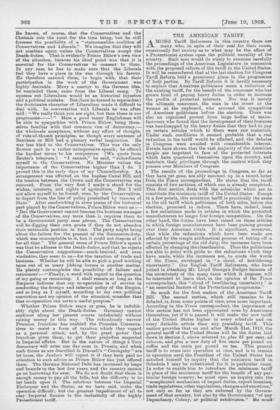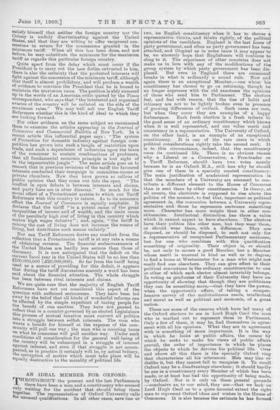TEE AMERICAN TARIFF.
A MONG Tariff. Reformers in this country there are many who, in spite of their zeal for their cause, occasionally feel anxiety as to what may be the effect of a Protectionist system upon the political morality of the country. Such men would do wisely to examine carefully the proceedings of the American Legislature in connexion with the proposed reform of the tariff in the United States. It will be remembered that at the last election for Congress Tariff Reform held a prominent place in the programme of both parties. By Tariff Reform it is hardly necessary to explain that American politicians mean a reduction of the existing tariff, for the benefit of the consumer who has grown tired of paying heavy duties iu order to increase the profits of protected interests. Nor was it merely the ultimate consumer, the man in the street or the woman at the cupboard, who aroused the sympathies of American politicians before the election. There was also an organised protest from large bodies of manu- facturers who found that the development of their business was handicapped by the heavy duties that they bad to pay on certain articles which to them were raw materials. Under such conditions it seemed probable that a real reduction in the tariff would be effected, and the, debates in Congress were awaited with considerable interest. Events have shown that the vast majority of the American people are impotent in face of the protected interests which have quartered themselves upon the country, and maintain their privileges through the control which they possess over Members of Congress.
The results of the proceedings in Congress, so far as they have yet gone, are ably summed up in a recent letter from the Times correspondent. He states that the tariff consists of two sections, of which one is already completed. This first section deals with the schedules which are to constitute the minimum tariff of the United States. Except in a few points, this minimum tariff is practically the same as the old tariff which politicians of both sides, before the election, promised to reduce. There have, indeed, been a few reductions made in articles in which the protected manufacturers no longer fear foreign competition. On the other band, the duties have been raised on those articles in which foreign manufacturers have been gaining ground over their American rivals. It is significant, moreover, that while the reductions which have been made are effected by the simple arithmetical process of taking off a certain percentage of the old duty, the increases have been effected by changing the classification. Thus the politicians are able to point with pride to the reductions which they have made, while the increases are, to quote the words of the Times, enveloped in " a cloud of bewildering uncertainty." Our English Tariff Reformers, who have joined in attacking Mr. Lloyd George's Budget because of the uncertainty of the many taxes which it imposes, will be interested to learn that, in the opinion of the Times correspondent, this " cloud of bewildering uncertainty " is " an essential feature of the Protectionist programme."
So much for the first section of the American Tariff Bill. The second section, which still remains to be debated, is, from some points of view, even more important. According to the Times correspondent, the importance of this section has not been appreciated even by Americans themselves, yet if it is passed it will make the new tariff of the United States higher iu every schedule and on every dutiable article than any preceding tariff. This section provides that on and after March 31st, 1910, the general tariff of the United States will be the duties laid. down in Section 1, above referred to, puss 25 per cent. ad valorem, and plus a. new duty of five cents per pound on coffee and ten cents per pound on tea. This general tariff is to come into operation at once, and is to remain in operation until the President of the United States has satisfied himself by inquiry that the minimum tariff in Schedule 1 may be substituted for it in particular cases. In order to enable him to introduce the minimum tariff in plane of the maximum tariff for the benefit of any par- tioular foreign country, he must open an inquiry into the "complicated mechanism of import duties, export bounties, trade regulations, other regulations, changes and exactions," not only so far as they are enforced by the Govern- ment of that country, but also by the Government "of any Dependency, Colony; or political subdivision." Re must, satisfy himself that neither the foreign country nor the Colony is unduly discriminating against the United States, and that they are willing to offer reciprocal con- cessions in return for the concessions granted in the minimum tariff. When all this has been done, and not before, he may substitute the minimum for the maximum tariff as regards this particular foreign country.
Quite apart from the delay which must occur if the President is to carry out the new duties entrusted to him, there is also the certainty that the protected interests will fight against the concession of the minimutn tariff, although that itself is almost prohibitory, and will produce a wealth of evidence to convince the President that he is bound to maintain the maximum rates. The position is ably summed up in the words of an American critic quoted by the Times correspondent, who says that "the interested and organised avarice of the country will be enlisted on the side of the maximum rates." We may well ask our English Tariff Reformers whether this is the kind of ideal to which they are looking forward.
For other evidence on the same subject we recommend them to examine the articles appearing in the Journal of Commerce and Commercial Bulletin of New York. In a recent article this influential paper says : " The system of Protection for domestic industry against foreign com- petition has grown into such a tangle of restriction upon trade, and such a dependence of industries upon the taxes of the consumer to sustain combinations of producers, that all fundamental economic principle is lost sight of in the impenetrable jungle." The same article goes on to remark that in previous revisions of the tariff the favoured interests conducted their campaign in committee-rooms or private chambers. Now they have grown so callous of public opinion that they come out into the open. " The conflict in open debate is between interests and claims, and party lines are in utter disarray." So much for the moral effect of a Protectionist system to which our Tariff Reformers wish this country to return. As to its economic effect the Journal of Commerce is equally emphatic. It declares that the tariff " is a potent cause of the great inequalities of income and of wealth, and the main cause of the peculiarly high cost of living in this country which makes high wages delusive" ; and, again, " the tariff in raising the coat of living does not increase the means of living, but distributes such means unfairly."
Nor can Tariff Reformers derive any comfort from the reflection that a Protectionist tariff is at any rate a means Of obtaining revenue. The financial embarrassments of the United States are hardly less serious than those of Germany. It is now anticipated' that the deficit on the current fiscal year in the United States will be no less than $100,000,000 (.220,000,000). So far from the tariff being used as a means of providing for this deficit, it appears that during the tariff discussions scarcely a word has been said about the financial situation. The whole struggle has been between rival interests and claims.
We are quite sure that the majority of English Tariff Reformers have not yet considered this aspect of the question with sufficient seriousness. They have been led away by the belief that all kinds of wonderful reforms can be effected by the simple expedient of taxing people for the benefit of one another. They have not paused to reflect that in a country governed by an elected Legislature this process of mutual taxation must convert all politics into a struggle between selfish interests. The man who wants a benefit for himself at the expense of the com- munity will pull one way ; the man who is resisting taxes on what he consumes will pull another way. Under such conditions all consideration for the general well-being of the country will be submerged in a struggle of interest against interest, and even if that struggle is not accom- panied, as in practice it certainly will be, by actual bribery, the corruption of motive which must take place will be equally destructive to the morality of political life.











































 Previous page
Previous page